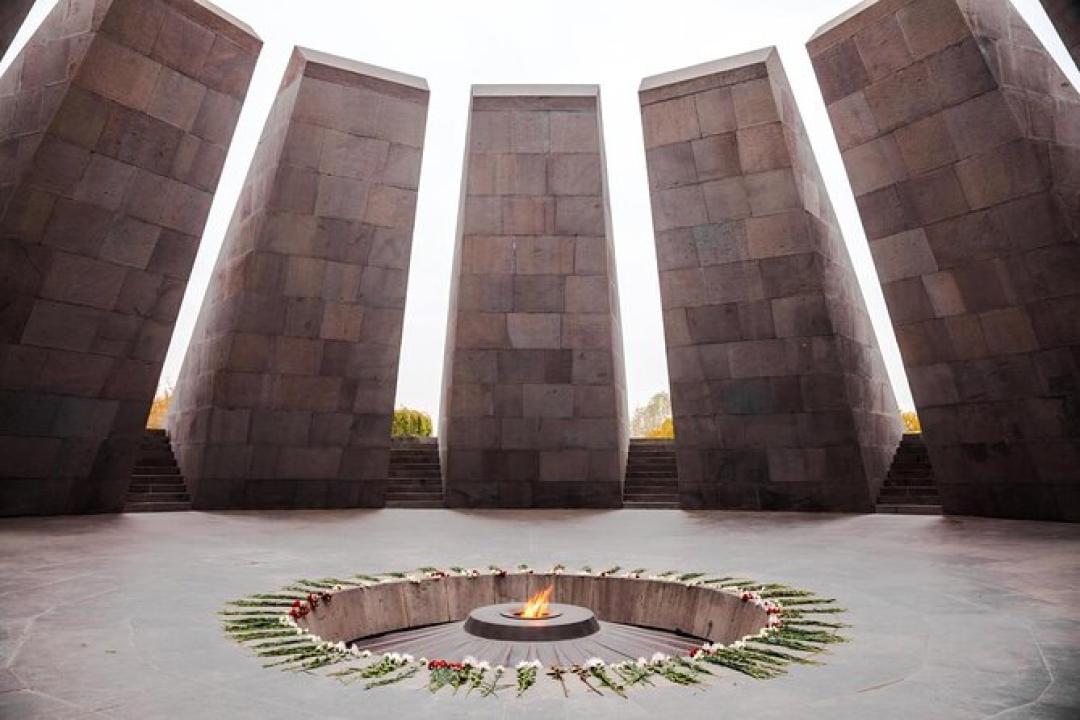
Armenia Commemorates Genocide: Pashinyan Condemns Flag Burning, Former Leader Criticizes Him, Turkey Rejects Genocide Characterization

On April 24, Armenians worldwide commemorated the 110th anniversary of the Armenian Genocide, with political leaders, international figures, and organizations reflecting on the tragedy, while tensions arose over flag-burning protests and differing positions on the genocide’s recognition.
Armenia’s political leadership, led by Prime Minister Nikol Pashinyan, paid tribute at Tsitsernakaberd alongside Speaker of the National Assembly Alen Simonyan, President Vahagn Khachaturyan, and government officials.
In his message, Pashinyan described the genocide as both a national and personal tragedy for Armenians, emphasizing that the enduring response must be the creation of a sovereign, secure, and prosperous Armenia with delimited borders, peaceful regional relations, open frontiers, and safeguarded citizens. He declared that such a state would honor the memory of the victims and fulfill the historic mission entrusted by past generations. Pashinyan underscored that this path is not one of mere optimism but of responsibility, asserting that the people of Armenia and their elected leadership will not squander the opportunity secured through the sacrifices of history’s martyrs.
The Armenian Foreign Ministry issued a statement honoring the victims and highlighting the genocide’s enduring significance in the international legal framework. It recalled the extermination of a significant portion of the Armenian population in the Ottoman Empire based solely on nationality, the seizure of property, and the destruction of cultural heritage. The statement noted that this historical crime contributed to the codification of genocide as an international crime through the 1948 UN Genocide Convention. The ministry emphasized Armenia’s active participation in global efforts to detect, prevent, and respond to mass atrocities, citing initiatives such as the 2015 establishment of December 9 as the International Day of Commemoration of Genocide Victims and the unanimous adoption of Armenia’s resolution on genocide prevention at the 55th session of the UN Human Rights Council in April 2024. The statement reaffirmed Armenia’s commitment to building a future rooted in tolerance, human rights, and peace.
On the same day, Nazeli Baghdasaryan, Press Secretary to the Prime Minister, conveyed Pashinyan’s position on the burning of Turkish and Azerbaijani flags during the April 23 torchlight procession organized by the Armenian Revolutionary Federation (ARF). Pashinyan condemned the act as irresponsible, unacceptable, and provocative, stating that burning the flags of internationally recognized neighboring states is inflammatory. Simultaneously, he condemned the shelling of a residential home in Khoznavar, Syunik Province, by Azerbaijani forces, as well as ceasefire violations, calling on Baku to investigate and provide explanations.
Robert Kocharyan, Armenia’s second president, spoke at Tsitsernakaberd, condemning Pashinyan’s criticism of the flag burning. Kocharyan accused the government of double standards, recalling a 2015 incident when then-activists—now officials—desecrated a Russian flag near the Russian Embassy. He dismissed Pashinyan’s attempt to link Azerbaijani border shootings with the flag burning as absurd.
Serzh Sargsyan, Armenia’s third president, issued a message marking the 110th anniversary of the Armenian Genocide, emphasizing that no one can silence the voice of justice and underscoring the enduring duty of Armenians and the international community to remember the victims and demand accountability. Sargsyan accused Turkey of ongoing denial and historical distortion, linking the forced displacement of over 140,000 Armenians from Nagorno-Karabakh in September 2023 to the Ottoman-era genocide. He recalled the unity of the Armenian nation during the 2015 centennial commemorations and warned against using the genocide as a bargaining chip in political processes, branding such behavior a betrayal of national interests. Sargsyan criticized the Armenian government, claiming that despite officials’ attendance at the memorial, the state has sidelined the genocide issue. He predicted that public discontent with the authorities would emerge before the 2026 elections and confirmed that the opposition was preparing a program, though it was not yet public.
At the Tsitsernakaberd Memorial Complex, Karekin II, Catholicos of All Armenians, stated that the Armenian people should transform their sorrow and pain into strength and new achievements for a prosperous Armenia, commemorating the victims of both the 1915 genocide and “recent tragedies in Nagorno-Karabakh.”
During a briefing, Maria Zakharova, Spokesperson for the Russian Foreign Ministry, reaffirmed Russia’s longstanding recognition of the Armenian Genocide and solidarity with Armenia, recalling that the Russian Imperial Army saved at least 350,000 Armenians in 1915 and that President Vladimir Putin personally participated in the 2015 centennial events in Yerevan.
The EU civilian mission in Armenia released a statement paying tribute to the victims and calling for efforts to prevent such atrocities in the future.
On April 24, the Turkish Foreign Ministry issued a statement rejecting characterizations of the 1915 events as genocide by several countries and advised Yerevan on how to conduct itself during commemoration days. The statement dismissed assessments of the 1915 events as violations of historical fact and international law, describing such claims as null and void and accusing their authors of exploiting historical pain for political aims. Emphasizing its commitment to regional peace, dialogue, and mutual prosperity, Turkey reaffirmed its proposal to establish a joint historical commission to examine the 1915 events objectively and scientifically. Ankara warned against encouraging what it called “radical circles” seeking to fuel hostility through history and reiterated its call for support of the ongoing normalization process between Turkey and Armenia.
See Also


Mirzoyan Meets US Deputy Assistant Secretary Joshua Huck

Azerbaijani President Holds Talks with UAE and German Business Delegations on Economic Cooperation

Grigoryan Confirms Armenia’s Readiness to Dissolve OSCE Minsk Group Upon Peace Treaty Signing

Azerbaijani Official Warns of Ecological Risks to Caspian Sea, Similar to Lake Urmia and Aral Sea

